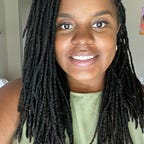Recognizing and Cultivating Black Genius
How Village of Wisdom is taking the time to work alongside a community of Black learners and families
There are 7.6 million black students in K-12 schooling going into Fall 2020. According to William Jackson, founder of Village of Wisdom, when you center social justice issues, challenge them to think about liberation from a really early age, ask them about the inventions, art, music that are going to be necessary to get to liberation, that’s 7 million chances at liberation. That’s why he believes liberation is inevitable.
A 2019 Ashoka fellow, Jackson founded Village of Wisdom to be a place where families and communities could reframe their approach to learning in a way that centers on Black genius. To do this, Village of Wisdom created a Black Genius Profile, a tool that documents a student’s academic, emotional, and cultural strengths. Since then, they have worked with a group of educators to embed the Black Genius Profile into their work.
In addition to working with educators, VOW has also been conducting community based participatory research (CBPR) with Black families in Durham, North Carolina. And they’ve been hearing parents in powerful ways — most importantly, hearing their excitement about what a liberatory learning space would look like. Hearing them talk about the experience they want to create for other families. Seeing them take ownership of the future of learning for Black learners. “We are all that we need,” William says to punctuate this idea. “When we trust ourselves we know what we need. It’s about us re-finding that trust and connection. The time is nigh. Our systems are visibly showing their fractures.”
A year from now, VOW hopes to develop a clearinghouse of parent-validated culturally-affirming learning strategies that can become a resource for people across the country. To get there, they plan to pilot instructional toolkits for teachers and digital care packages for parents and see how these tools are used And this attentiveness to their learning is what young Black people deserve, given that they deal with a constant questioning of their humanity.
What has Jackson learned from this year of listening and partnering with the families of Durham? The one mistake he feels he’s made is thinking that this would move fast. Instead, he’s learned, “You have to do community work at the speed of trust.” It’s so easy to get caught in the mindset of we have to do this now. Instead, VOW is taking the time to be intentional, responsive, and collaborative in what they build.
In the midst of all of this learning and service, Jackson is trying to find at least thirty minutes a day to invest in himself. His wife convinced him to join her as she listened and walked to Girl Trek’s 21-day black history boot camp podcast. Built a garden and has been taking care of that. Tried to grow some watermelon to share with his family and failed, but learned a lot from the process. As a Black parent himself, Jackson cares deeply about the community he is serving. He knows the power inherent in being a Black caregiver, and his team’s work is dedicated to tapping into that genius to better serve Black learners for years to come.
